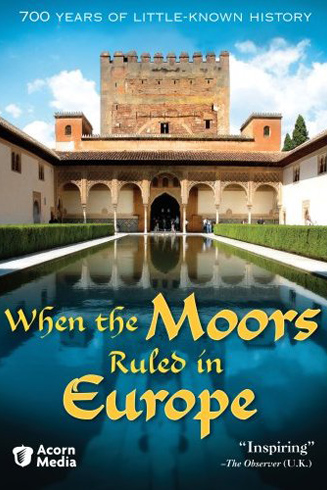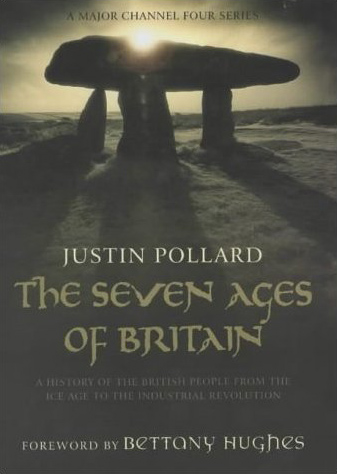is Britain’s best-loved and most prolific pop historian. She has appeared in no fewer than 11 television programmes in the past four months, with hotly-anticipated The Hemlock Cup, a major new book on legendary philosopher Socrates, out this October.
With Hughes’ formidable CV in mind here’s a handy list of her publications on Heritage Key – they’re available to buy right here, so if one takes your fancy just click the title or the book’s cover.
When the Moors Ruled in Europe
This rangy DVD sees Hughes exploring one of Europe’s least-known eras: the Islamic occupation of Iberia, today’s Spain and Portugal, between the 7th and 14th centuries AD.
It’s a hidden history partly because subsequent Christian kings sought to wipe any trace of the Moors’ influence on their nation, following the brutal Spanish Inquisition.
But it’s still there, and via interviews, careful study and the unveiling of the mathematical secrets behind Granada’s inimitable Alhambra Palace Hughes lifts the lid on what many believe is the basis of western culture.
Other stunning sites are visited, primarily in the arid southern lands of Andaluca. The programme was rated highly on its 2004 debt:the Wall Street Journal notes that it is “infused with important complexity”, while the Guardian describes it as “inspiring”.
The Minotaur’s Island
5,000 years ago on the Greek island of Crete an incredible civilisation grew. Yet the Minoans, who dominated their environment long before the period we know as Classical Greece arrived, are best-known for the tale of the Minotaur, a fearsome creature who roamed a labyrinth beneath the magnificent Palace of Knossos.
What was the significance of the great culture? How did they build warren-like palaces with hinged doors and flushing toilets, and what is the significance of their mysterious bull-leapers? Hughes steps back in time to explore the enigmatic people and debunk many of the myths surrounding them.
Helen of Troy: Goddess, Princess, Whore (book) & Helen of Troy (DVD)
Helen of Troy: the face that launched 3,000 ships. Since her entry into the annals of ancient history, barely a recognised writer didn’t attempt to eulogise her beauty and influence. But who was she? In this book Hughes dismantles life for a woman in the Bronze Age, showing the life Helen would have lived through her palaces, slaves, jewellery, feasts and religious beliefs.
Was Helen of Troy an elegant leader of men, or troublesome home-wrecker? Some say she was the reason for enduring bitterness between east and west because of her double marriage to the kings of Greece and the Hittite Empire – but others view her as a hero, a unifying entity in a world ravaged by war and greed. This book aims to explain her life through factual, rather than literary, evidence.
The accompanying DVD, which aired originally in the US, was equally as well-received as the book, and sees Hughes roaming the labyrinthine passageways of some of ancient Greece’s greatest landmarks in search of the real Helen. You can read a review of the show here.
The Seven Ages of Britain
This highly-rated TV show, based on the book – foreworded by Hughes – by Justin Pollard, chronicles the history of the British Isles through, unsurprisingly, seven ages, from the Ice Age to the Industrial Revolution. Thousands of years ago Britain wasn’t even an island, and prehistoric cave-dwellers forged a meagre existence among its frozen forests and fields.
Today Britain is one of the world’s major nations, with sprawling urban developments and multi-national industry. How did the country come to be, and what are the pivotal moments in Britain’s history? This series was viewed warmly by critics. One Daily Mail critic wrote: “Bettany Hughes is to factual history what Charlotte Uhlenbroek is to natural history the perfect televisual combination of brains and beauty.“
The Spartans
Everyone loves the Spartans, right? From hairbrained comedies to Hollywood bloodfests the brutal ancient empire have never been far from the public eye, and this three-part Channel 4 show, available to buy on DVD, runs through the revolutionary society that made the Spartans such a deadly force in Greece.
The first part deals with the inception of Sparta, and the legendary Battle of Thermopylae which has made it into so many popular outlets. The second part reveals the relationship between Sparta and Athens, first allies then mortal enemies, and the third and final episode goes from the war with Athens and Sparta’s eventual demise following the Battle of Leuctra. 300 director Zack Snyder cited Hughes’ documentary as a major influence on his multi-million dollar-grossing epic: she is even interviewed in the DVD extras.
Athens: Dawn of Democracy
Everyone knows Athens as a paragon of philosophical and artistic brilliance, a centre of commerce and a thriving intellectual hub. But what really went on in the world’s first democracy? Hughes discovers a world run on slavery, a brutal governmental regime and obsession with wiping out the opposition.
This documentary, aired in the US, is a fascinating insight into one of the world’s most recognised ancient civilisations, and allows Bettany Hughes to get stuck into Athenian life, her specialist subject. The famous polis is picked apart in style and day-to-day secrets of the empire, that allowed it to flourish at the expense of others, are exposed.


